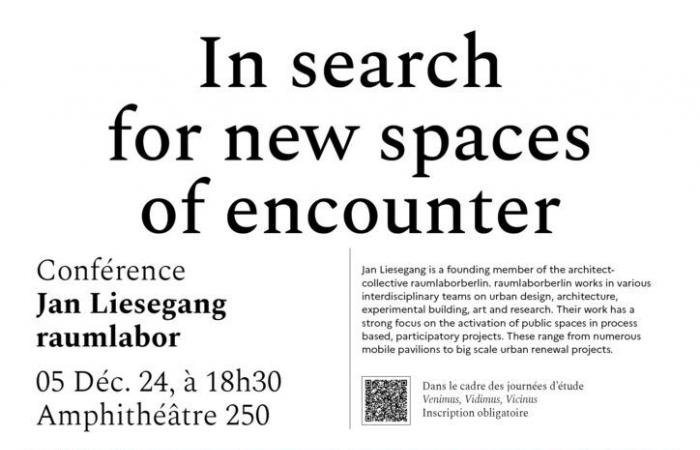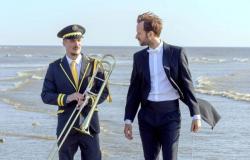
This conference is part of the program of the study days “Venimus, Vidimus, Vicinus We came, we saw — [en / un.e] i could.e.
Registration required: here
Space laboratory Berlin
Raumlabor Berlin is a group of nine associated architects, based in Berlin, Germany. The group was created in 1999 by six architects: Andrea Hofmann, Axel Timm, Benjamin Foerster-Baldenius, Francesco Apuzzo, Jan Liesegang, and Markus Bader. In 2000, the architect Christof Mayer and his partner Martin Heberle established an architectural office which became a subsidiary of Raumlabor Berlin. In 2002, architect Matthias Rick joined the group after graduating. Raumlabor Berlin does not see itself as a conventional architectural agency but rather as an open group (made up of architects, urban planners, landscapers and artists) who seeks to collaborate with professionals from other fields: scenographers , filmmakers, artists, musicians, ethnologists or sociologists, for their various projects
Consult the official website of the collective: here
Jan Liesegang
Jan Liesegang is a founding member of the architect-collective raumlaborberlin. raumlaborberlin works in various interdisciplinary teams on urban design, architecture, experimental building, art and research.
Their work has a strong focus on the activation of public spaces in process based, participatory projects. These range from numerous mobile pavilions to big scale urban renewal projects.
In his work and teaching Jan is especially interested in exploring the limits of the narrative dimensions in architecture and in strengthening the identity of urban spaces. Jan’s latest projects include the recently opened public park, sauna and river pool in the former free harbour of Gothenburg ; a Summer School and public activation project in an abandoned brick factory in the centre of Prishtina, Kosovo in the context of the Manifesta Biennale 2022 and the on going project development for an inclusive artist house and academy in collaboration with X-SÜD an mixed-abled artist collective, in an old steel factory in Cologne.
Since 2017 he is professor for architecture at the Bergen School of Architecture. As reflections on the collaborative practices and working methods in different projects Jan has co- published a number of books: house of time / living in the now, Triënnale Brugge, 2019 ; Cantire Barca, reflections on the self-built community Center in a Suburb of Turin, 2016 building the city together on experimental architecture and new self-organized public spaces 2015.
Jan Liesegang is a founding member of the architectural collective raumlaborberlin, which works in various interdisciplinary teams on urban design, architecture, experimental building, art and research.
Their work is strongly focused on activating public spaces in process-based participatory projects. These projects range from numerous mobile pavilions to large-scale urban renewal projects.
In his work and teaching, Jan is particularly interested in exploring the limits of the narrative dimensions of architecture and reinforcing the identity of urban spaces. Among Jan’s latest projects are the recently opened public park, sauna and river swimming pool in the former free port of Gothenburg, a summer school and a public activation project in an abandoned brickworks in central Pristina, in Kosovo, as part of the Manifesta Biennale 2022, as well as the ongoing development of an inclusive artist house and academy project in collaboration with X-SÜD, a multi-party artist collective tables, in a former steelworks in Cologne.
Since 2017 he has been professor of architecture at the Bergen School of Architecture. As reflections on collaborative practices and working methods in different projects Jan has co-published a number of books: house of time / living in the present, Triënnale Brugge, 2019; Cantire Barca, reflections on the self-built community center in a suburb of Turin, 2016 building the city together on experimental architecture and new self-organized public spaces 2015.
Photography © Tea Marta





